Struggling to keep up with a rise in customer inquiries due to limited resources? You’re not alone. Many businesses dream of offering 24/7 support but can’t justify the costs of a full-time team.
In fact, as per Inc., 51% of customers now expect round-the-clock service. But Geckoboard report reveals that only 28% of companies can meet that demand. This is where AI in customer service steps in.
Studies show that businesses can save $11 billion annually without compromising customer satisfaction by implementing AI chatbots, according to Juniper Research.
This blog post will go over the practical advantages of AI customer support agents as well as how they operate. We will additionally reveal how you can effectively implement them to open up new possibilities for your company. Well, let’s get going.
AI Agent in Customer Service and Their Roles
So what are ai agents? Artificial intelligence (AI) agents are highly developed systems made to operate autonomously in challenging situations. They constantly learn and adjust in response to the data they process, rather than merely following predetermined guidelines.
Instead of the strict programming of traditional programs, these systems are outfitted with Machine Learning (ML) and Natural Language Processing (NLP) capabilities. This enables them to perform a variety of tasks without the need for human assistance, from responding to straightforward consumer inquiries to addressing complex issues.
AI agents are exceptional at performing their tasks because they can get better over time. A chatbot that interacts with consumers, for instance, can improve its responses over time by learning from past exchanges. They differ from traditional AI systems that depend on human input for optimization because of their capacity for dynamic learning.
It goes without saying that the need for instant, accurate service has never been higher. According to Forbes’ 2024 Customer Service and CX Research, 64% of customers will switch companies after a poor service experience, regardless of how good the product is.
Let’s look at how AI agents work and deliver value in customer service:
1. Perceive Changes in Customer Sentiment
AI agents are highly adept at monitoring customer sentiment during support interactions. They analyze tone, language, and behaviour in real time.
When signs of frustration appear, they adjust responses, such as suggesting alternative solutions or offering empathy, to maintain positive engagement. This adaptability improves service quality and customer satisfaction.
2. Real-Time Responsive Actions
AI agent in customer service instantly respond to shifts in customer mood or interaction context, such as detecting frustration.
They may escalate tickets, suggest immediate solutions, or adjust responses to align with customer needs. This responsiveness keeps customer interactions smooth and support-outcomes more satisfying.
3. Advanced Reasoning Abilities
AI agents go beyond data collection. They analyze past interactions to provide tailored responses. By assessing customer history, they can suggest personalized solutions or product recommendations that align with individual preferences.
This level of insight allows agents to deliver faster, more relevant support, enhancing customer experience and satisfaction.
4. Proactive Problem-Solving
Whether troubleshooting technical issues or identifying bottlenecks in workflows, AI customer service agents excel in problem-solving.
They offer fast solutions by analyzing various scenarios and determining the most effective path forward, saving time and improving operational performance. For instance, they may detect patterns of complaints and proactively offer solutions before issues escalate.
5. Predictive Learning and Adaptation
AI agents learn from every customer interaction, using past data to anticipate needs. This proactive insight enables them to respond with more relevant, personalized support, enhancing customer satisfaction with each engagement.
6. Strategic Action Planning
AI agents assess various scenarios to develop action plans that align with service goals. By forecasting challenges and preparing responses, they empower support teams to make quick, informed decisions. This improves both service efficiency and customer satisfaction.
Types of AI Agents for Customer Service
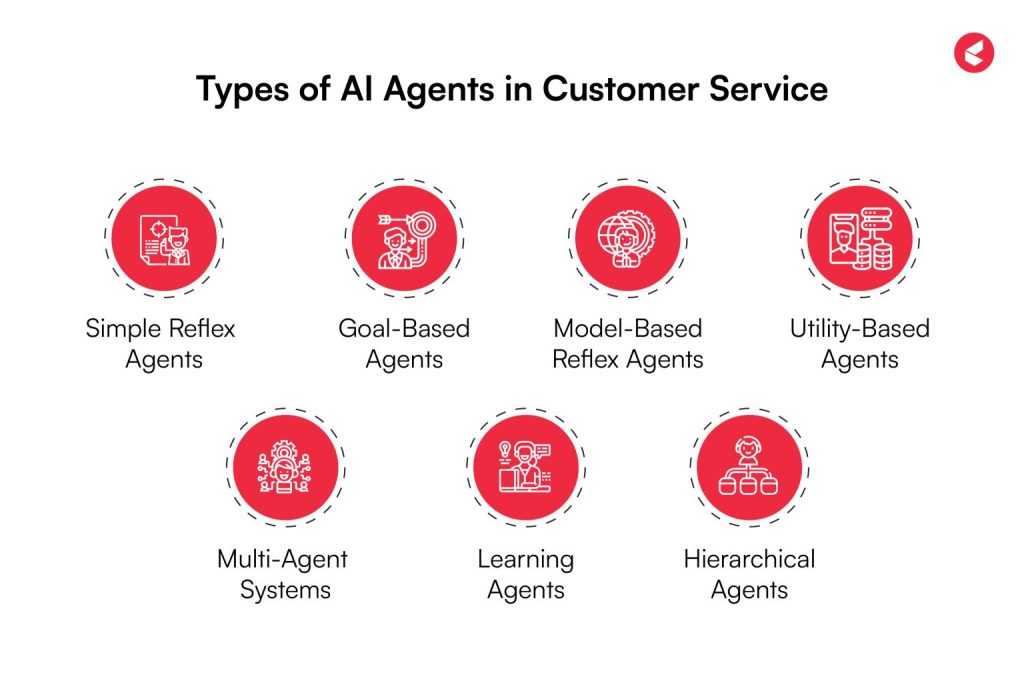
AI agent assistance comes in several variations, each suited for specific tasks and environments.
Here are six different types suitable for various business automation scenarios:
1. Simple Reflex Agents
These agents respond to specific conditions based on predefined rules. They don’t have the ability to learn or adapt, as their actions depend solely on the current input.
In customer service, they are ideal for straightforward and repetitive tasks like password resets or FAQ-based responses. However, due to their limited capabilities, they struggle in complex environments.
2. Goal-Based Agents
Goal-based agents prioritize achieving long-term objectives. Instead of simply reacting to inputs, they evaluate potential outcomes of actions based on specific goals.
They can help manage complex processes, such as resolving multi-step issues, routing tickets to the correct department, or automating follow-up responses. Their decision-making ability makes them suitable for tasks requiring strategic planning and foresight.
3. Model-Based Reflex Agents
These agents use an internal model to interpret unseen parts of their environment. They track interactions, using stored knowledge to predict user needs.
For instance, if a customer returns with a recurring issue, these agents can infer the problem and offer personalized solutions. This improves service efficiency and addresses issues beyond immediate data inputs.
4. Utility-Based Agents
Utility-based agents use a utility function to evaluate options and select actions that maximize value. These agents excel in scenarios like choosing the most efficient route for issue resolution based on customer preferences.
For instance, when managing multiple inquiries, these agents can determine the most valuable course of action, such as handling VIP customer queries before general requests.
5. Multi-Agent Systems (MAS)
MAS involves several AI agents working together to achieve common goals. Each agent has its task, but they coordinate for optimal outcomes.
These systems are useful in supply chain management, where agents coordinate tasks across departments. Their collective intelligence allows them to optimize processes, resulting in faster and more accurate service.
6. Learning Agents
Learning agents adapt and improve through experience. By analyzing past interactions, they enhance their ability to respond to customer needs over time.
This allows them to personalize responses, leading to better customer experiences. For example, a chatbot improves its suggestions for resolving issues based on past successful interactions with a similar user profile.
7. Hierarchical Agents
Hierarchical agents function in a tiered system, where high-level agents oversee and guide lower-level ones. This structure is ideal for handling large-scale customer service operations.
For example, in a telecom company, a top-tier AI agent might manage the overall customer journey, while lower-level agents handle specific tasks like resolving billing issues or answering inquiries. This approach allows complex tasks to be broken down and managed efficiently.
Benefits of AI Agent in Customer Service
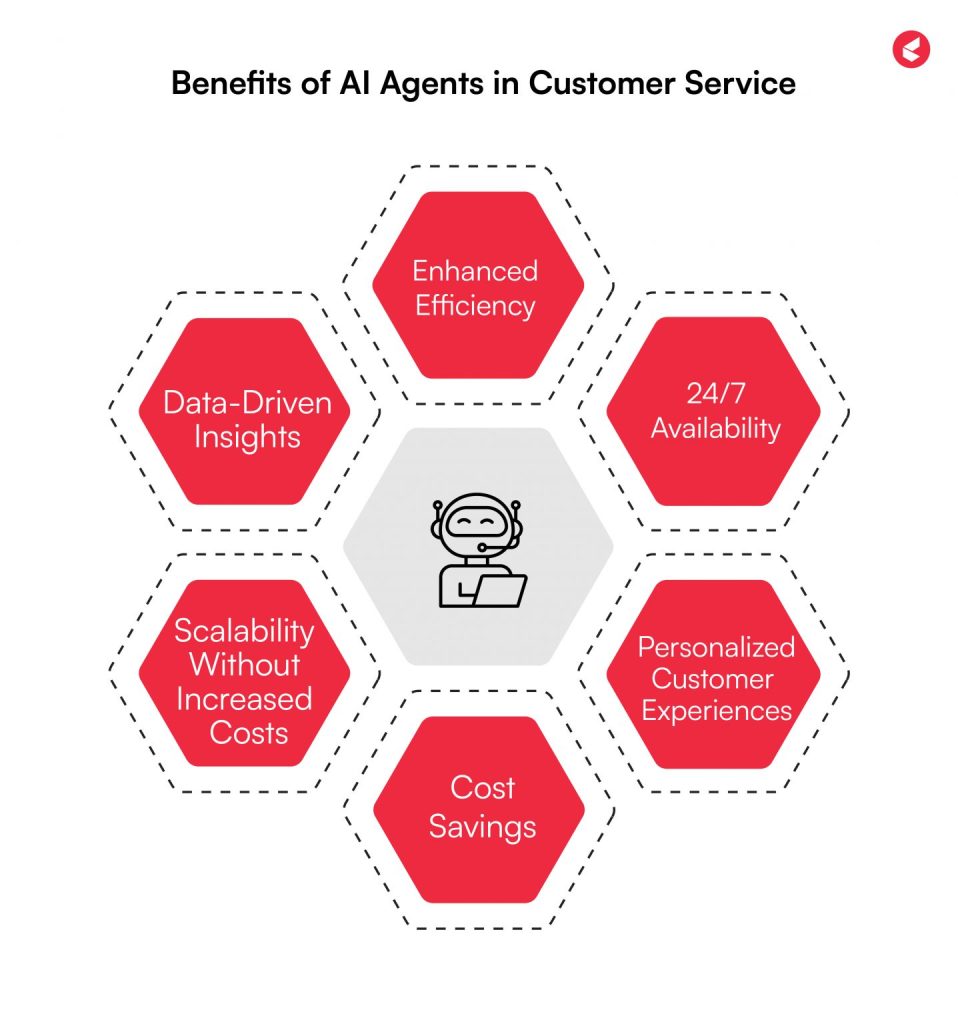
From better customer experiences to operational effectiveness, AI agents provide many advantages, helping companies outsmart their competitors. Here are some of the most prominent benefits that highlight the importance of AI agents for customer service in this sphere:
1. Enhanced Efficiency
AI agents effortlessly handle all the time-consuming, repetitive tasks, including data entry, scheduling, basic analysis, and processing basic requests. You free the human agent to deal with more complex customer issues when you automate such mundane tasks.
McKinsey states that companies adopting AI solutions experience a 30 to 45% hike in productivity. This allows your company to serve more inquiries in a shorter time frame with the same service quality.
2. 24/7 Availability
One significant advantage of AI agents is their ability to work around the clock without fatigue and breaks. Your customers receive support at any time, regardless of time zones or business hours. This continuous presence helps you meet customer expectations for real-time assistance and improves overall satisfaction.
3. Personalized Customer Experiences
As mentioned, AI agents can analyze customer data and behavior to offer personalized responses and recommendations. This level of personalization augments customer satisfaction and loyalty.
Forbes states that 85% of customers favor doing business with organizations that offer superior customer service. By tailoring interactions using agentic AI solutions, you improve the customer journey and encourage repeat business. You improve the customer journey and get more repeat business by tailoring interactions using AI.
4. Cost Savings
AI agents reduce operational costs by handling routine tasks that would otherwise require a large workforce. By automating such processes, you save on salaries, training, and benefits while reducing errors.
Moreover, AI’s ability to optimize workflows results in long-term cost reductions. An IBM study suggests that AI-infused virtual agents cut labor expenses by up to 30%, demonstrating significant savings over time.
5. Scalability Without Increased Costs
AI agents can seamlessly scale to meet rising demand without additional resources. During high-traffic periods like promotions or product launches, AI agents manage increased inquiries without compromising service quality.
This scalability allows your business to grow efficiently, handling surges in demand without the proportional increase in operational costs. This flexibility makes AI agents essential for businesses with varying customer support requirements.
6. Data-Driven Insights
AI agents provide insightful information by examining vast volumes of customer interaction data. This information helps you detect customer pain points, trends, and service areas requiring improvements.
Using these insights, you can make wise decisions that improve customer satisfaction and promote innovation.
Challenges of Using AI Agent in Customer Service
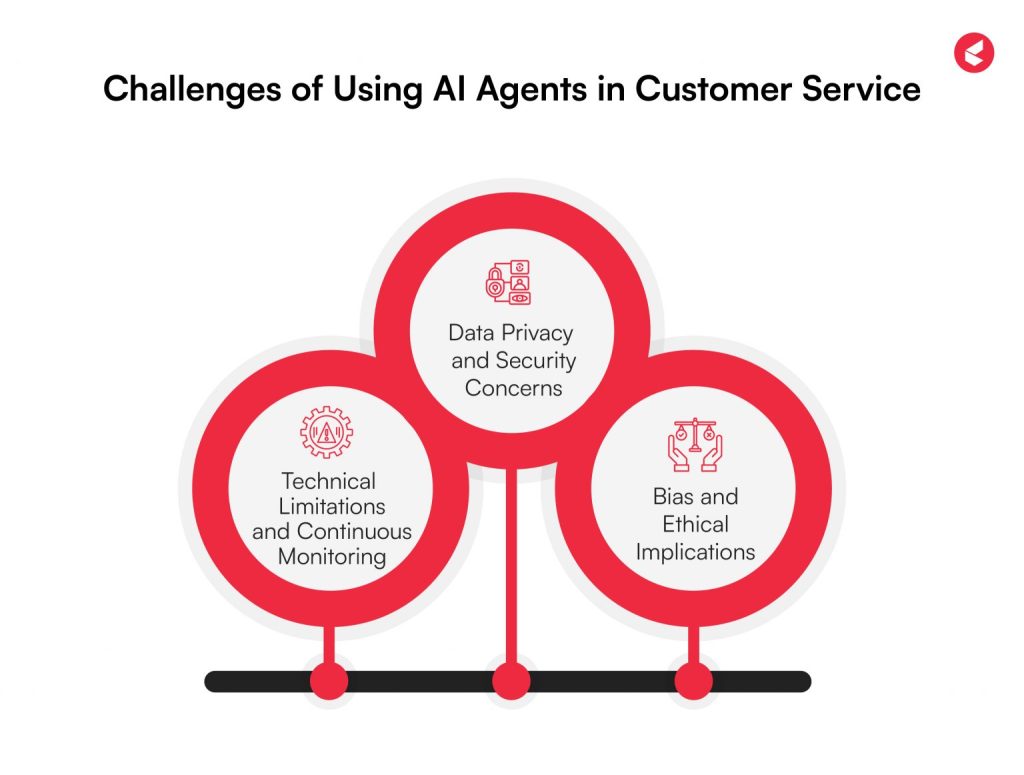
AI agents offer exciting potential, but they also present notable challenges. Businesses must address these issues to ensure successful implementation.
Factor in these three significant challenges before implementing AI in customer service:
1. Data Privacy and Security Concerns
To implement AI agents, you need massive volumes of sensitive customer information. Responsible data management is the key to sustaining confidence.
Make sure to adopt stringent data privacy protocols to prevent breaches and misuse. A sound data protection plan incorporates encryption, access restriction, and transparency in data handling.
Furthermore, organizations must comply with regulations like GDPR to guarantee that customer data is collected, processed, and stored ethically. Customers are increasingly aware of privacy concerns, and failure to protect data can severely harm a brand’s reputation.
2. Bias and Ethical Implications
If trained on unbalanced or discriminatory data, AI agents can unintentionally perpetuate bias. This can lead to unfair decisions, potentially harming certain customer segments.
For instance, AI used in customer support may prioritize requests from certain users based on biased historical data. To avoid these pitfalls, businesses must ensure their AI agents are trained with inclusive, fair datasets.
Transparent algorithms and regular audits are essential to minimize bias and uphold ethical standards. Additionally, AI agent companies must establish governance frameworks to monitor and update these systems for fairness continuously.
3. Technical Limitations and Continuous Monitoring
While AI agents are designed to learn and improve autonomously, they can also develop faulty patterns. Without proper oversight, these systems may produce inaccurate or unintended results.
For example, an AI agent might start offering incorrect responses based on flawed data or overfitting certain customer profiles. Therefore, businesses should not treat AI as a “set and forget” solution.
Regular monitoring and human intervention are required to correct any missteps. Additionally, AI systems often need time to fully mature and achieve their intended outcomes, requiring patience and ongoing adjustments.
Use Cases of AI Agents in Customer Service
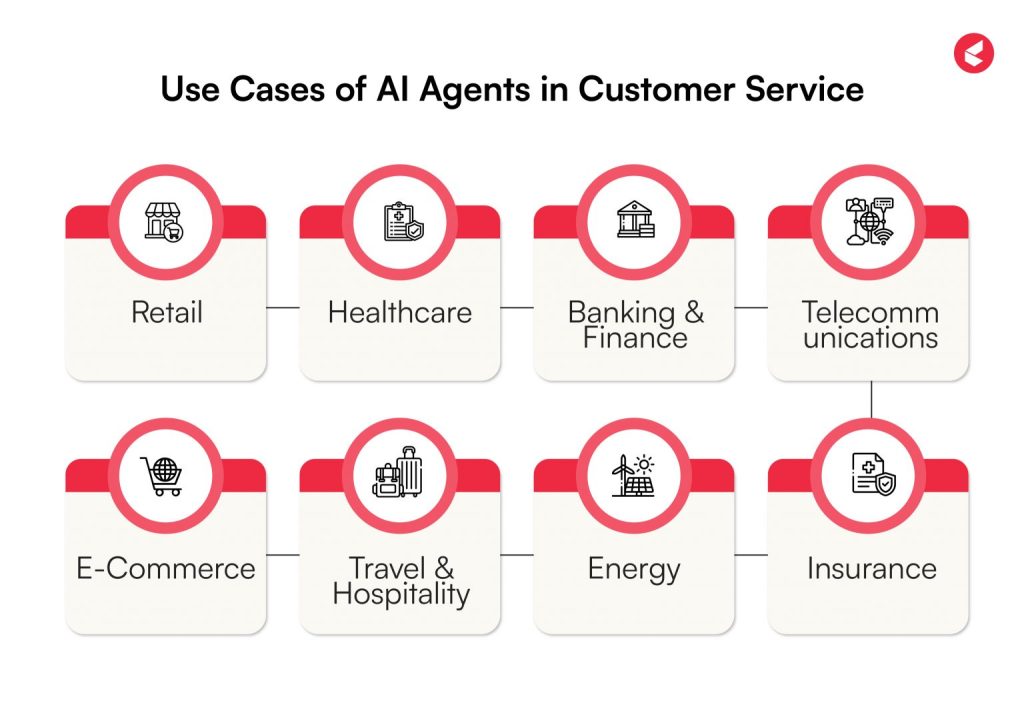
AI agents are reshaping customer service across industries with enhanced experiences.
Let’s explore how different sectors leverage AI agents to improve customer interactions:
1. Retail Sector
AI agents in retail improve customer service by managing order issues, providing real-time delivery updates, and offering instant assistance for returns or exchanges.
They streamline these common tasks, enabling faster resolutions and reducing customer frustration. This automation boosts customer satisfaction while relieving pressure on human support staff.
For example, many e-commerce brands utilize AI agents to assist customers with tracking their orders, managing returns, and even recommending products based on browsing history. These agents can handle high volumes of inquiries simultaneously, providing immediate responses and freeing up human agents to focus on more complex issues.
By understanding customer preferences, AI-driven support can also offer tailored promotions and product recommendations, driving up engagement and sales.
2. Healthcare
In healthcare, AI agents offer administrative support by scheduling appointments and answering basic patient queries. For example, Healthily’s AI chatbots help patients book appointments and provide general guidance.
While they don’t give medical advice, they assist with initial queries and direct patients to appropriate resources, allowing medical staff to focus on care. This increases efficiency and patient satisfaction. Many providers are now enhancing these capabilities with advanced AI healthcare solutions, which integrate patient data management, predictive analytics, and workflow automation to further improve outcomes and streamline hospital operations.
3. Banking & Finance
AI agents in the finance sector focus on fraud detection and handling routine transactions. These agents review transaction data for anomalies, preventing potential fraud. With AI in Fraud Detection, they spot anomalies in real time, preventing risks and protecting customers.
Wells Fargo, for example, uses AI chatbots to handle everyday banking inquiries, reducing customer wait times.
They also provide tailored financial advice, including investment suggestions and expense tracking, based on user data. This boosts security and the entire customer experience at the same time.
4. Telecommunications
Telecom companies like Verizon employ AI agents to manage customer inquiries and troubleshoot technical problems. These agents can answer routine questions about service plans and help with bill payments. They even diagnose connection issues remotely.
By providing quick solutions and minimizing call center wait times, AI agents increase customer satisfaction and operational effectiveness.
5. E-Commerce
E-commerce platforms like Shopify utilize AI agents to optimize customer journeys, from browsing products to finalizing purchases. These agents provide product suggestions in real time and offer order status updates. For businesses exploring options beyond Shopify, considering the best Shopify alternative can help find platforms that also leverage AI agents effectively to enhance the overall shopping experience.
They also resolve common issues like payment failures.
With their ability to manage several interactions simultaneously, AI agents make online purchase experiences smoother. As a result, customer retention and conversion rates significantly improve.
6. Travel & Hospitality
In the travel sector, AI agents manage bookings and make trip suggestions. Based on personal choices, they assist customers in locating the best flights, accommodations, and activities.
For example, Expedia uses AI to suggest ideal hotels and activities based on user preferences, making travel planning easier.
AI agents lessen human agents’ workload by managing cancellations or adjustments to reservations. This guarantees effortless service and boosts customer satisfaction.
7. Energy
AI agents augment energy customer support by delivering real-time insights on usage patterns. This helps customers monitor and manage consumption more effectively.
They also provide proactive tips for conserving energy and reducing costs, enabling customers to make informed choices and feel supported by their energy provider.
For instance, Tesla’s Powerwall system uses AI to monitor energy usage and optimize efficiency, which benefits businesses and their clients.
8. Insurance
AI agents streamline insurance processes by automating claims management and underwriting. Lemonade Insurance, for instance, uses AI agents to approve claims in just minutes.
They assess claims in real time using customer data and suggest actions, reducing the time required for claim approvals.
Additionally, AI agents aid in detecting false claims, guaranteeing smoother and more accurate insurance procedures. Modern tools like CRM for insurance platforms further support insurers by centralizing policyholder data, improving communication, and enhancing overall customer experience.
Best Practices for Getting Started with AI Agent Assistance
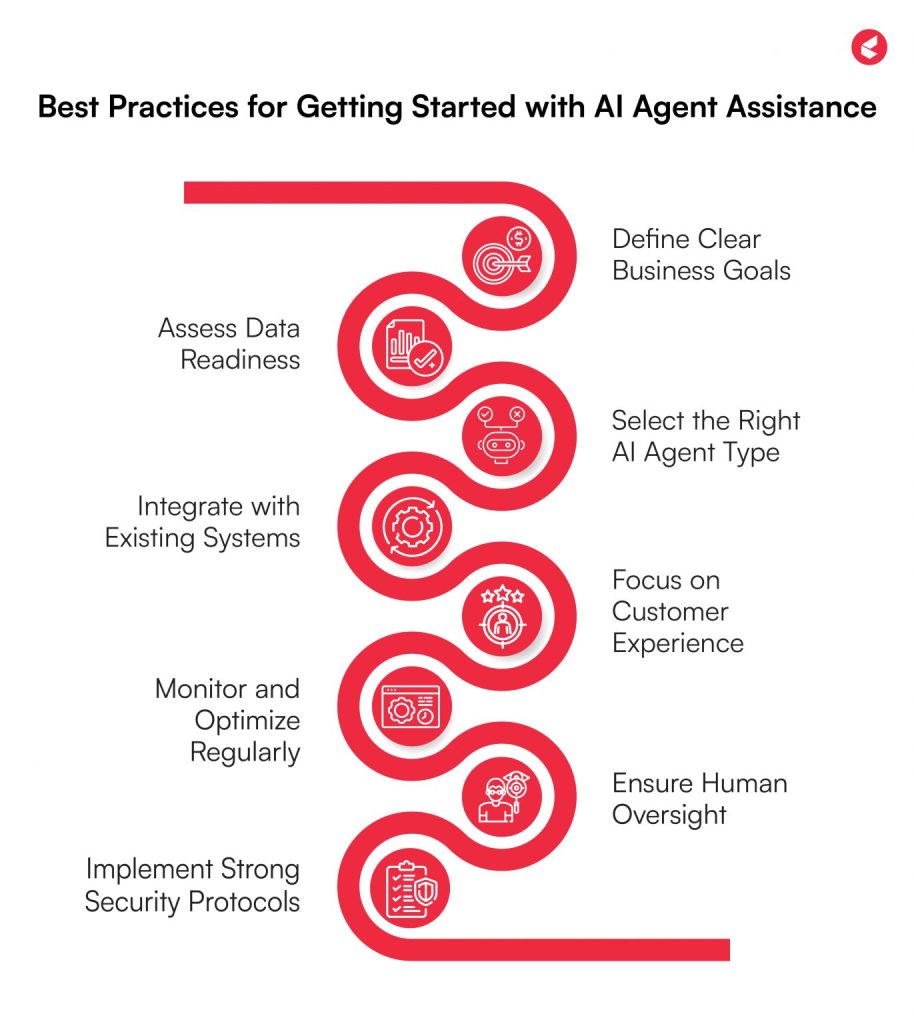
You require meticulous planning and execution to implement AI agents. Follow these steps to ensure a successful deployment that drives efficiency.
1. Define Clear Business Goals
Start by identifying what you aim to achieve with AI agents. Are you looking to elevate customer satisfaction while reducing response times? Or do you wish to streamline operations? Having clear and measurable goals is important.
These objectives will shape your approach and help track progress as you implement AI agents in customer service.
2. Assess Data Readiness
AI agents depend on high-quality data to function successfully. Start by reviewing or assessing your data collection and management systems. Your data must be accurate, well-structured, and thorough.
This comprises past interactions, purchase information, and behavioral insights. Clean and organized data helps AI agents provide error-free responses.
3. Select the Right AI Agent Type
Different types of AI agents suit different needs. A reactive agent is appropriate for routine tasks. However, for complex processes like personalized support or problem-solving, consider learning or goal-oriented agents.
These intelligent agents adapt over time, providing more advanced solutions to changing customer requirements.
4. Integrate with Existing Systems
Make sure your existing customer service platforms —CX and helpdesk tools— integrate seamlessly. This guarantees AI agents can access data in real-time and react appropriately.
Integration also minimizes the likelihood of information gaps, providing a more reliable and consistent service experience.
5. Focus on Customer Experience
Prioritizing user experience when designing AI agents is key. Ensure interactions are natural and intuitive. Prompt and accurate responses lead to higher levels of customer satisfaction.
Prior to deployment, run thorough testing to identify any potential issues and ensure the agent meets or exceeds customer expectations.
6. Monitor and Optimize Regularly
Ongoing performance tracking is essential to maintaining the effectiveness of AI agents. Gather feedback from users and analyze agent performance data to identify areas for improvement.
Regular updates and optimization help ensure your AI agents remain relevant, adaptive, and capable of addressing changing customer needs.
7. Ensure Human Oversight
While AI agents can automate many duties, human oversight remains vital for more sensitive or complex interactions. Clearly define when human intervention is required.
This hybrid paradigm ensures customers always get the right assistance, irrespective of whether a human or agent is managing the issue.
8. Implement Strong Security Protocols
Data privacy must not be compromised while deploying AI agents. Therefore, data protection laws like the GDPR must be followed.
To safeguard your business and uphold confidence, conduct regular security audits and encrypt sensitive customer data. Strong security measures protect private information and avert breaches.
The Future of Customer Service: How AI Agents Will Lead the Way
AI agents are revolutionizing customer service in interesting ways. Below are five emerging trends in the future of AI-driven customer experiences:
1. AI-Driven Self-Service Portals
AI agents will enhance self-service platforms, enabling customers to resolve queries independently. From smart FAQs to interactive chatbots, AI will guide users through processes in a more intuitive manner.
This will lessen dependency on human agents and allow customers to resolve concerns at their convenience.
2. Real-Time Emotional Intelligence
In the future, AI agents will incorporate emotional intelligence features to understand customer emotions through sentiment and tone analysis. This will enable them to adapt their responses based on customer moods.
They will offer empathetic solutions that improve customer satisfaction and defuse potentially tense interactions.
3. Seamless Omni-Channel Support
AI agents will provide uniform support across various communication channels—email, chat, social media, and phone. This means customers will receive the same standard of service, no matter the channel where they interact.
The user experience across all platforms will improve, thanks to businesses’ increased ability to handle customer interactions better.
4. AI-Powered Predictive Maintenance
AI agents will use past data and system performance to forecast when customers are likely to experience problems. Businesses can use this predictive analysis to prevent issues before they arise, resulting in proactive customer service.
This trend will lead to fewer complaints and stronger customer relationships.
5. Voice and Multilingual AI Agents
AI agent will excel in voice-based interactions, allowing for natural, conversational communication across different languages. As voice recognition and translation technologies progress, they will offer smooth multilingual help.
Businesses will be able to serve a wider audience, eliminating the requirement for language-specific human agents.
Wrapping Up
Customer service is undergoing a massive change, thanks to AI agents that offer personalized support at a large scale. With AI agents leading the way, the future of customer service promises greater efficiency and profitability.
Businesses that employ AI solutions, like Kapture CX, will be able to provide better customer experiences, control costs, and stay competitive in the global market.
Kapture empowers organizations with its cloud-based customer support automation software. With AI at its core, Kapture is reinventing customer service with faster resolutions, hyperpersonalized experiences, and effortless omnichannel support.
Kapture’s AI-based solutions, regardless of how small or large the enterprise, offer the capabilities to optimize and improve client service. So, whether you are a startup or a well-established corporation, Kapture has tailored solutions that meet your unique needs.
Watch Kapture’s AI Agent Video :
Schedule a demo today and see how we can help you deliver exceptional customer experiences!
FAQs
AI agents are more advanced than chatbots. While chatbots handle basic queries, AI agents use machine learning and natural language processing to understand complex requests. They provide personalized responses and learn from interactions to improve over time.
Yes, AI agents can complement human agents by handling routine tasks and escalating more complex issues to human support. This collaboration improves efficiency while ensuring a seamless transition between AI and human support.
AI agents are particularly beneficial for industries with high customer interaction volumes, like e-commerce, telecommunications, and banking. They can streamline inquiries, offer personalized support, and ensure 24/7 availability.
Yes, AI agents can be tailored to fit specific business workflows and customer preferences. They can integrate with existing systems and be trained on industry-specific data, ensuring they align with the company’s support processes and goals.
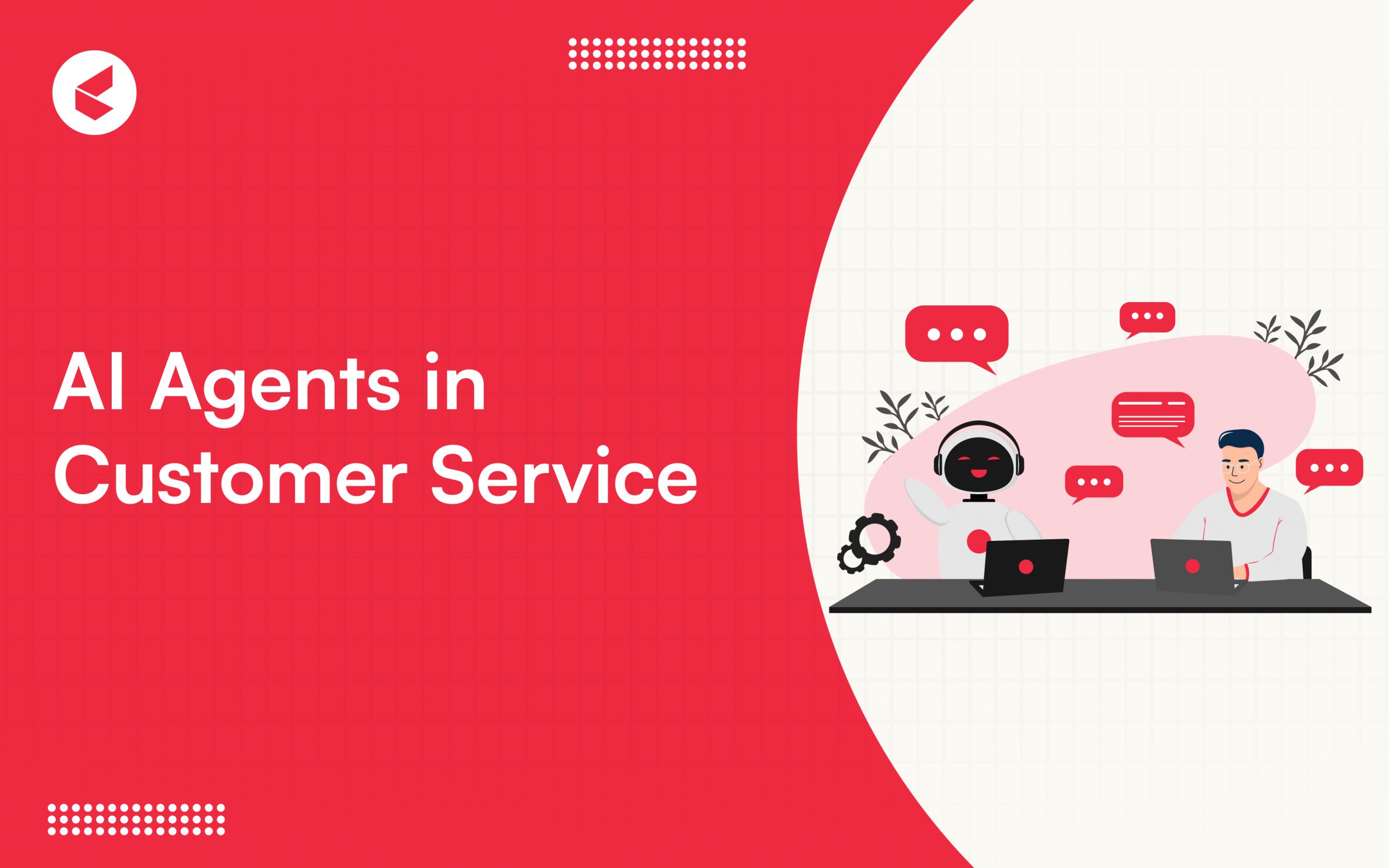

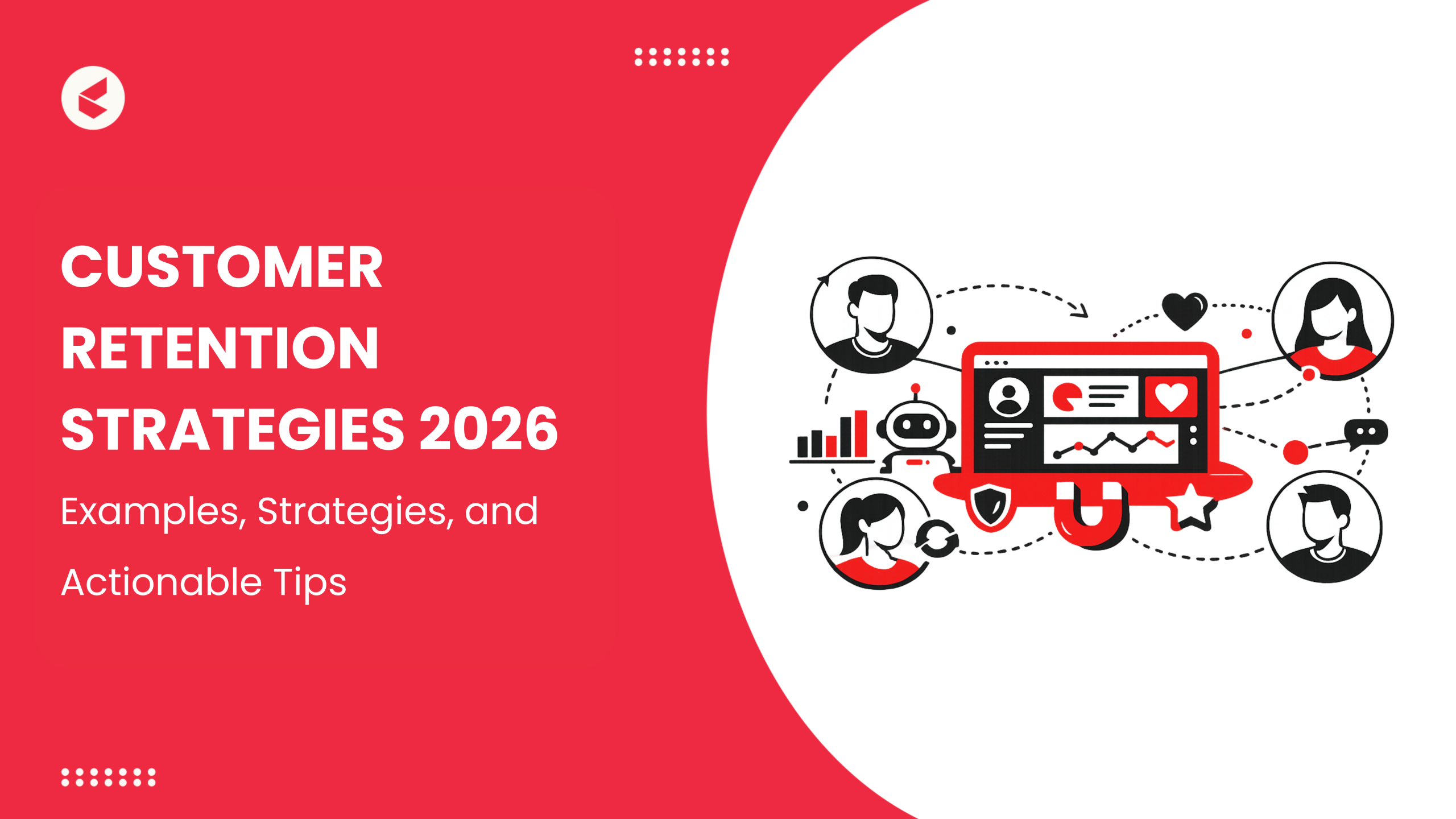
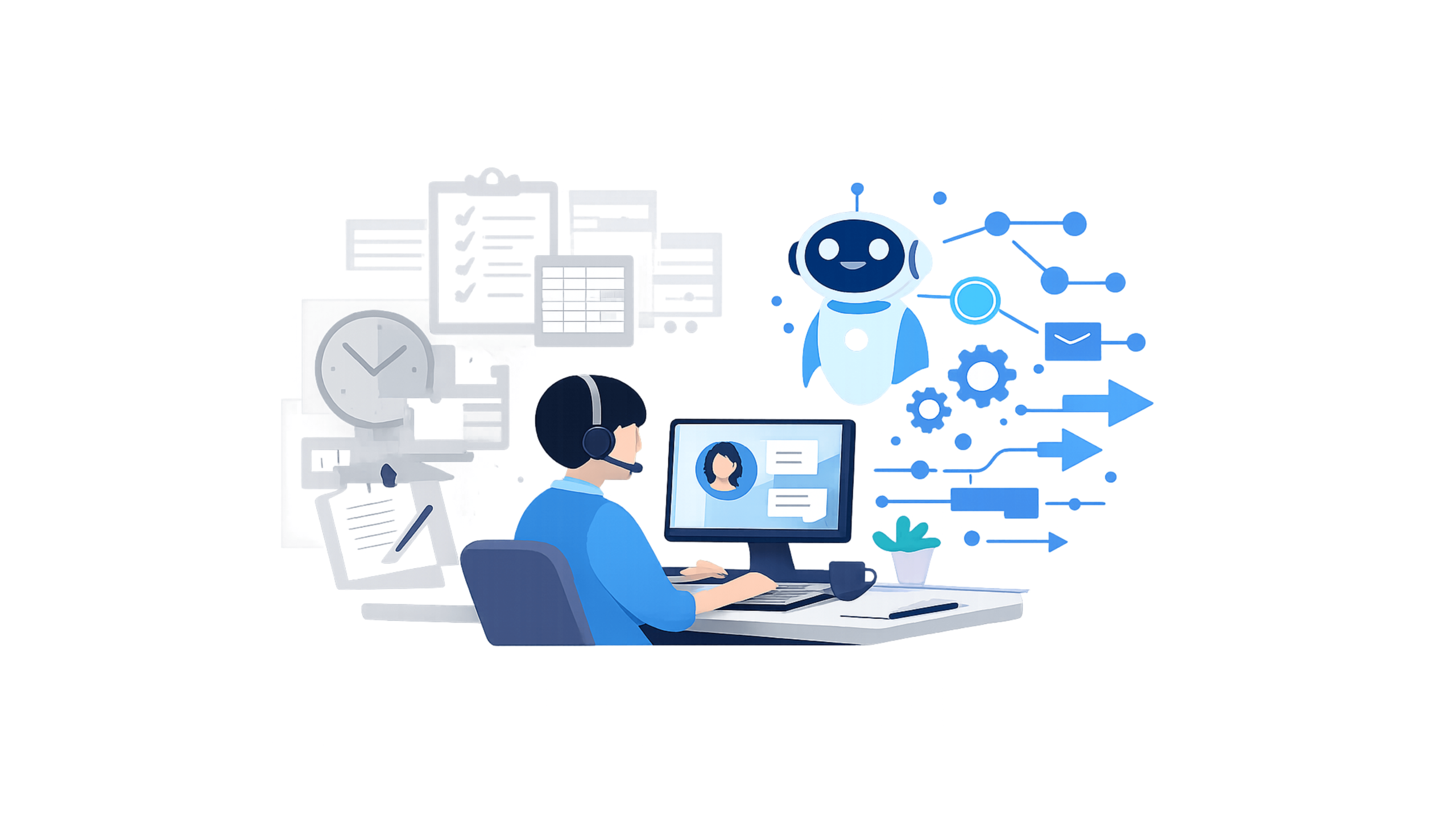
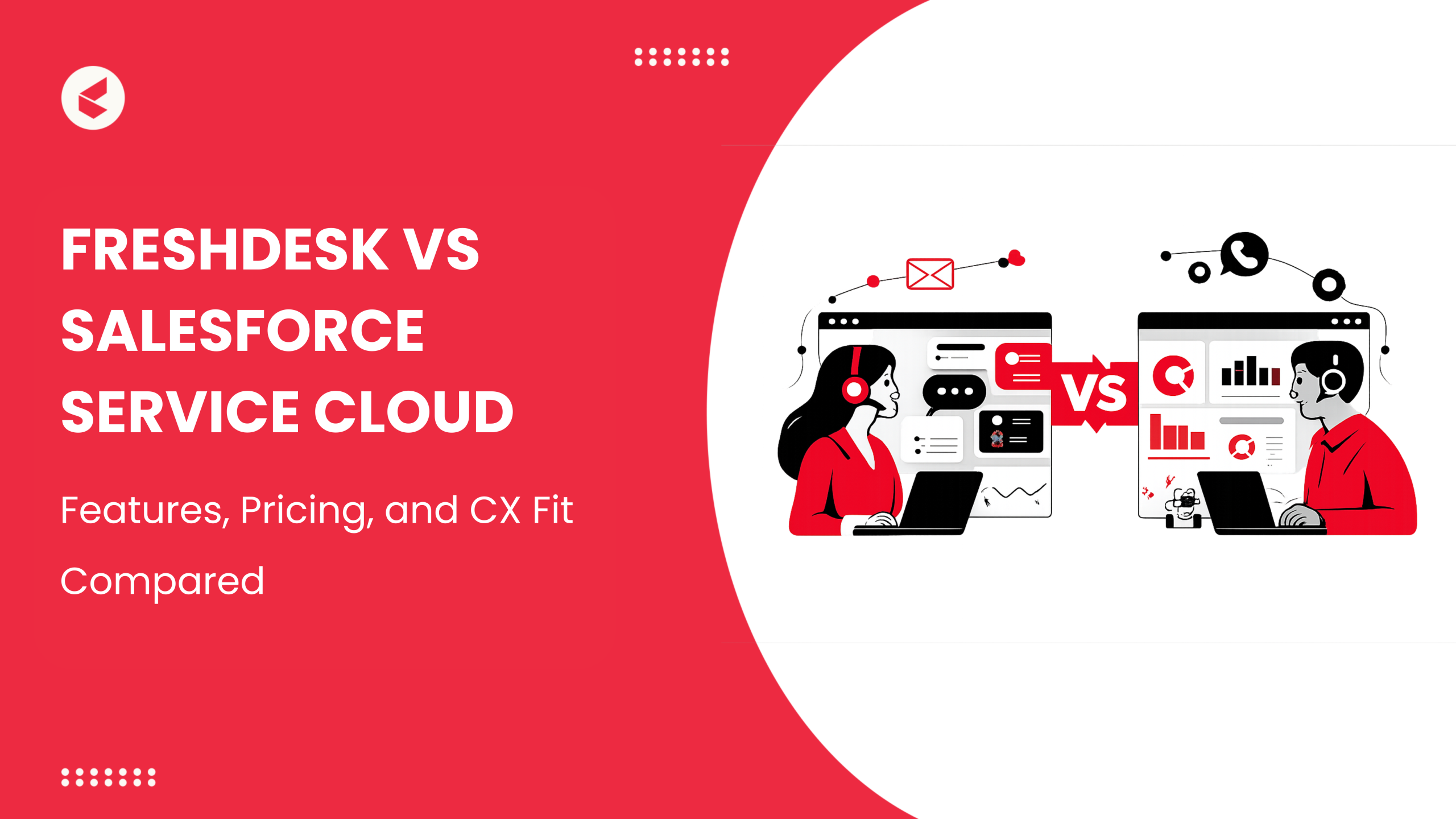










One thought on “AI Agent for Customer Service : Everything You Need to Know”
Comments are closed.